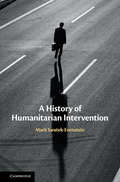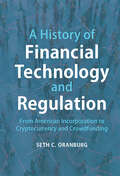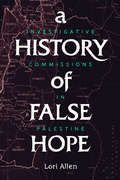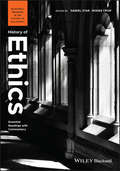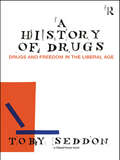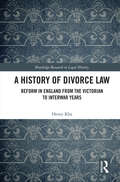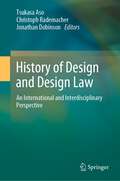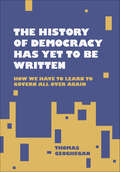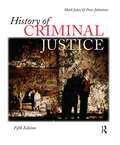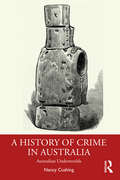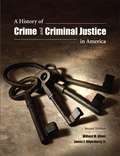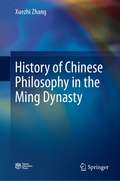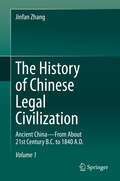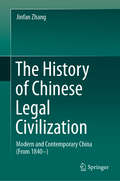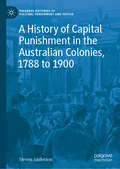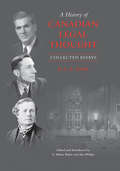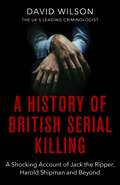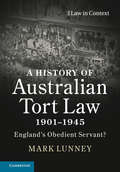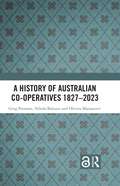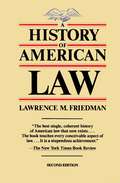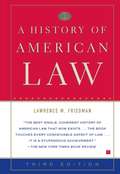- Table View
- List View
A History of Humanitarian Intervention
by Mark Swatek-EvensteinThe question of 'humanitarian intervention' has been a staple of international law for around 200 years, with a renewed interest in the history of the subject emerging in the last twenty years. This book provides a chronological account of the evolution of the discussion and uncovers the fictional narrative provided by international lawyers to support their conclusions on the subject, from justifications and arguments for 'humanitarian intervention', the misrepresentation of great power involvement in the Greek War of Independence in 1827, to the 'humanitarian intervention that never was', India's war with Pakistan in 1971. Relying on a variety of sources, some of them made available in English for the first time, the book provides an undogmatic, alternative history of the fight for the protection of human rights in international law.
A History of Human Rights Society in Singapore: 1965-2015 (Politics in Asia)
by Jiyoung SongTo celebrate Singapore’s fiftieth anniversary for its independence from Malaysia in 2015, 35 students, academics and activists came together to discuss and write about pioneering Singaporean human rights activists and their under-reported stories in Singapore. The city-state is known for its remarkable economic success while having strict laws on individual freedom in the name of national security, public order and racial harmony. Singapore’s tough stance on human rights, however, does not negate the long and persistent existence of a human rights society that is little known to the world until today. This volume, composed of nine distinctive chapters, records a history of human rights activists, their campaigns, main contentions with the government, survival strategies and other untold stories in Singapore’s first 50 years of state-building.
A History of Financial Technology and Regulation: From American Incorporation to Cryptocurrency and Crowdfunding
by Seth C. OranburgUsing the lens of history, A History of Financial Technology and Regulation illuminates recent changes to the world of finance. With lucid prose and the help of concrete examples, Seth Oranburg helps readers understand the role of technology in finance today, including complex phenomena such as mutual funds, cryptocurrencies, and the stock market itself. Chapters begin with basic principles and historical analogy before describing complex digital-investment strategies and instruments. Readers will also gain an introduction to key concepts in financial regulation, learning how law and regulations prevented some financial crises while perpetuating others. Oranburg concludes with ideas about what's next for finance and how the law should respond. This book will appeal to specialists and nonspecialists alike who are interesting in learning more about business, economics, finance, law, and regulation.
A History of False Hope: Investigative Commissions in Palestine
by Lori AllenThis book offers a provocative retelling of Palestinian political history through an examination of the international commissions that have investigated political violence and human rights violations. More than twenty commissions have been convened over the last century, yet no significant change has resulted from these inquiries. The findings of the very first, the 1919 King-Crane Commission, were suppressed. The Mitchell Committee, convened in the heat of the Second Intifada, urged Palestinians to listen more sympathetically to the feelings of their occupiers. And factfinders returning from a shell-shocked Gaza Strip in 2008 registered their horror at the scale of the destruction, but Gazans have continued to live under a crippling blockade. Drawing on debates in the press, previously unexamined UN reports, historical archives, and ethnographic research, Lori Allen explores six key investigative commissions over the last century. She highlights how Palestinians' persistent demands for independence have been routinely translated into the numb language of reports and resolutions. These commissions, Allen argues, operating as technologies of liberal global governance, yield no justice—only the oppressive status quo. A History of False Hope issues a biting critique of the captivating allure and cold impotence of international law.
History of Ethics: Nicomachean Ethics (Blackwell Readings in the History of Philosophy)
by Daniel Star Roger CrispIs there an objective moral standard that applies to all our actions? To what extent should I sacrifice my own interests for the sake of others? How might philosophers of the past help us think about contemporary ethical problems? As the most recent addition to the Blackwell Readings in Philosophy series, History of Ethics: Essential Readings with Commentary brings together rich and varied excerpts of canonical work and contemporary scholarship to span the history of Western moral philosophy in one volume. Editors Star and Crisp, noted scholars in their fields, expertly introduce the readings to illuminate the main philosophical ideas and arguments in each selection, and connect them to broader themes. These detailed and incisive editorial commentaries make the primary source texts accessible to students while guiding them chronologically through the history of Western ethics. Structured around a thematic table of contents divided into three distinct sections, History of Ethics charts patterns in the development of ethical thought across time to highlight connections between intellectual movements. Selections range from the work of well-known figures such as Plato, Aristotle, Nietzsche, and Mill to the work of philosophers often overlooked by such anthologies, including Butler, Smith, Sidgwick, Anscombe, Foot, and Frankena. Star and Crisp skillfully arrange the collection to connect readings to contemporary issues and interests by featuring examples such as Aquinas on self-defense and the doctrine of double effect, Kant on virtue, and Mill’s The Subjection of Women. Written for students and scholars of ethics, History of Ethics is a comprehensive collection of readings with expert editorial commentary that curates the most important and influential work in the history of ethics in the Western world.
A History of Drugs: Drugs and Freedom in the Liberal Age
by Toby SeddonWhy are some psychoactive substances regarded as ‘dangerous drugs’, to be controlled by the criminal law within a global prohibition regime, whilst others – from alcohol and tobacco, through to those we call ‘medicines’ – are seen and regulated very differently? A History of Drugs traces a genealogy of the construction and governance of the ‘drug problem’ over the past 200 years, calling into question some of the most fundamental ideas in this field: from ‘addiction’ to the very concept of ‘drugs’. At the heart of the book is the claim that it was with the emergence in the late eighteenth century of modern liberal capitalism, with its distinctive emphasis on freedom, that our concerns about the consumption of some of these substances began to grow. And, indeed, notions of freedom, free will and responsibility remain central to the drug question today. Pursuing an innovative inter-disciplinary approach, A History of Drugs provides an informed and insightful account of the origins of contemporary drug policy. It will be essential reading for students and academics working in law, criminology, sociology, social policy, history and political science.
A History of Divorce Law: Reform in England from the Victorian to Interwar Years (Routledge Research in Legal History)
by Henry KhaThe book explores the rise of civil divorce in Victorian England, the subsequent operation of a fault system of divorce based solely on the ground of adultery, and the eventual piecemeal repeal of the Victorian-era divorce law during the Interwar years. The legal history of the Matrimonial Causes Act 1857 is at the heart of the book. The Act had a transformative impact on English law and society by introducing a secular judicial system of civil divorce. This swept aside the old system of divorce that was only obtainable from the House of Lords and inadvertently led to the creation of the modern family justice system. The book argues that only through understanding the legal doctrine in its wider cultural, political, religious, and social context is it possible to fully analyse and assess the changes brought about by the Act. The major developments included the end of any pretence of the indissolubility of marriage, the statutory enshrinement of a double standard based on gender in the grounds for divorce, and the growth of divorce acrossall spectrums of English society. The Act was a product of political and legal compromise between conservative forces resisting the legal introduction of civil divorce and the reformers, who demanded married women receive equal access to the grounds of divorce. Changing attitudes towards divorce that began in the Edwardian period led to a gradual rejection of Victorian moral values and the repeal of the Act after 80 years of existence in the Interwar years. The book will be a valuable resource for academics and researchers with an interest in legal history, family law, and Victorian studies.
History of Design and Design Law: An International and Interdisciplinary Perspective
by Tsukasa Aso Christoph Rademacher Jonathan DobinsonFor the first time, this book provides an up-to-date history of product design and product design law covering 17 countries — Japan, Korea, China, Singapore, the United Kingdom, Germany, France, Italy, the Nordic countries (Denmark, Finland, Iceland, Norway and Sweden), Russia, the United States, Brazil and Australia — selected for their innovative or influential approach to design or design protection.Each country is the subject of two chapters — one on the history of design and the other on the history of design law — authored by experts in design and intellectual property (IP) law. This unique interdisciplinary approach explains why and how various national design protection systems (that can include design, copyright, trade mark, competition and civil laws) developed, making it an ideal book for students, researchers and lawyers. The book also serves as an international survey of different national policy and legal responses to historical developments and specific design and legal issues allowing readers to consider their advantages and disadvantages — and so is also recommended for policy and law makers, as well as organizations that administer IP rights. Topics include the subject matter of design protection; procedural and substantive requirements; design registration; infringement; and the overlap of design rights and other IP rights. The chapters on design history provide further context to the historical development of these legal concepts by considering major design movements, key designers and iconic designs and the current state of design. The chapters highlight the connected and often complementary relationship between the two histories, not only for each country, but at the regional and international level, often as a result of government policies, trade, colonialism, immigration and globalisation. Design and design practice continue to become more global and evolve with developments in technology. At the same time, design laws are not internationally harmonized and continue to develop at the national level, with a number of significant changes occurring in recent years. This timely book shows how the lessons of the past continue to inform the future direction of design and the legal systems developed to protect it.
The History of Democracy Has Yet to Be Written: How We Have to Learn to Govern All Over Again
by Thomas Geoghegan"This book made me laugh out loud and also gave me glimpses of an entire horizon of possibility I hadn't seen before."--Chris Hayes, host of MSNBC's All In with Chris Hayes End the filibuster. Abolish
A History of Cyber Security Attacks: 1980 to Present
by Bruce MiddletonStories of cyberattacks dominate the headlines. Whether it is theft of massive amounts of personally identifiable information or the latest intrusion of foreign governments in U.S. government and industrial sites, cyberattacks are now important. For professionals and the public, knowing how the attacks are launched and succeed is vital to ensuring cyber security. The book provides a concise summary in a historical context of the major global cyber security attacks since 1980. Each attack covered contains an overview of the incident in layman terms, followed by a technical details section, and culminating in a lessons learned and recommendations section.
History of Criminal Justice
by Mark Jones Peter JohnstoneCovering criminal justice history on a cross-national basis, this book surveys criminal justice in Western civilization and American life chronologically from ancient times to the present. It is an introduction to the historical problems of crime, law enforcement and penology, set against the background of major historical events and movements. Integrating criminal justice history into the scope of European, British, French and American history, this text provides the opportunity for comparisons of crime and punishment over boundaries of national histories. The text now concludes with a chapter that addresses terrorism and homeland security.
A History of Crime in Australia: Australian Underworlds
by Nancy CushingThis book provides a lively and accessible account of Australia’s most prominent crimes and criminals of the nineteenth and twentieth century and offers an informative background for those seeking to understand crimes committed today. A History of Crime in Australia examines the imposition of English law on this ancient continent, and how its operation affected both transported offenders from Great Britain and Ireland, and the Aboriginal and Torres Strait Islander peoples whose own systems of Law were overlaid. Drawing upon cutting-edge research in the field, original work by the author, and essays from leading crime history researchers, it addresses the question of whether there was an Australian underworld. In doing so, it provides background for well known offenders including bushranger Ned Kelly and the razor gangs of the 1920s and for sensational crimes like the Mount Rennie Outrage, the Pyjama Girl Mystery and the Shark Arm Murder and the miscarriage of justice following the disappearance of Azaria Chamberlain at Uluru in 1980. Through these case studies, the book draws out points of tension and cohesion within Australian society, exposing the enduring anxiety around those who were considered to be outsiders, and how the criminal justice system was used to manage these concerns. This book includes a guide to conducting research in the field of Australian crime history and sources for further study. Designed as an introductory text for students, this book will be of interest to those studying criminology and crime history, and anyone who would like to deepen their understanding of crime’s place in Australia’s social and cultural history.
A History of Crime and Criminal Justice in America
by Willard Oliver James HilgenbergThis updated second edition provides an overview of the origin and development of the American criminal justice system, from the founding of Jamestown, the first English settlement, and tracing history to the events of September 11, 2001. Each chapter begins with an overview of the social, political, and economic forces that shaped society during a given era in American history. What follows, then, is an overview of the ordinary and extraordinary crimes of each era, and how the criminal justice system (police, courts, corrections, and juvenile justice) responded to these crimes, thereby conveying how the system developed over time.
History of Chinese Philosophy in the Ming Dynasty
by Xuezhi ZhangThis book starts with the classification of the main views of different thinkers after the study of the original materials, which covers all the thinkers’ thoughts and conceptions. A major objective of this book is to reveal the ideas of the philosophers. Key ideological opinions are stated with the former discussion of exact questions and further clarification of their philosophical meaning, which enables the readers to better understand the meaning and value of the philosophical thoughts. Since the logic and history are in accordance with each other, a frame of conception is formed then. Then, the author clearly explains the logical relationship in the frame mentioned before, as well as the formation of the key concepts and their relationship.
The History of Chinese Legal Civilization: Ancient China—From About 21st Century B.C. to 1840 A.D.
by Jinfan ZhangThis book, based on the theory of Marxism-Leninism, aims to study the essence, content and features of various legal systems in China in different historical periods, as well as the rules of the development of Chinese legal system. It effectively combines classic and historical analysis to probe the historical facts and elaborate the historical role of the legal system, revealing both the general and the specific rules of the development of the Chinese legal system on the basis of the existing relevant researches. The subject matter is of abundant theoretical and practical significance, as it enriches Marxist legal studies, deepens the readers’ understanding of Chinese legal civilization and offers guiding principles for the creation of socialist legal systems with Chinese characteristics. The chapters are structured chronologically, ranging from the Xia and Shang Dynasties, the Western Zhou Dynasty, the Spring and Autumn Period, the Han Dynasty, the South and North Dynasties, the Sui and Tang Dynasties, the Song Dynasty to the Ming and Qing Dynasties when Chinese legal system took on its final form. The chapters are compiled according to legislation, administrative law, criminal law and judicial system. Besides, the Chinese legal civilization after the Revolution of 1911 led by Sun Yat-sen is also addressed.
The History of Chinese Legal Civilization: Modern and Contemporary China (From 1840–)
by Jinfan ZhangThis book, based on the theory of Marxism-Leninism, aims to study the essence, content and features of various legal systems in China in different historical periods, as well as the rules of the development of Chinese legal systems. It effectively combines classic analysis and historical analysis to probe historical facts and elaborate the historical role of the legal system, revealing both the general and the specific rules of the development of China s legal system on the basis of the existing relevant research. The subject matter is of abundant theoretical and practical significance, as it enriches Marxist legal studies, deepens readers’ understanding of China s legal civilization and offers guiding principles for the creation of socialist legal systems with Chinese characteristics. It discusses the trends in thinking on the reconstruction of the legal system; changing laws; western legal culture; the legal system in the period of westernization, constitution and reform; preparation for constitutionalism; modification of the law during the late Qing Dynasty; criminal, civil and commercial legislation; and judicial reforms in the modern era as well as the various ups and downs and cases of malconduct after the founding of the People’s Republic of China.
A History of Capital Punishment in the Australian Colonies, 1788 to 1900 (Palgrave Histories of Policing, Punishment and Justice)
by Steven AndersonThis book provides a comprehensive overview of capital punishment in the Australian colonies for the very first time. The author illuminates all aspects of the penalty, from shortcomings in execution technique, to the behaviour of the dying criminal, and the antics of the scaffold crowd. Mercy rates, execution numbers, and capital crimes are explored alongside the transition from public to private executions and the push to abolish the death penalty completely. Notions of culture and communication freely pollinate within a conceptual framework of penal change that explains the many transformations the death penalty underwent. A vast array of sources are assembled into one compelling argument that shows how the ‘lesson’ of the gallows was to be safeguarded, refined, and improved at all costs. This concise and engaging work will be a lasting resource for students, scholars, and general readers who want an in-depth understanding of a long feared punishment.Dr. Steven Anderson is a Visiting Research Fellow in the History Department at The University of Adelaide, Australia. His academic research explores the role of capital punishment in the Australian colonies by situating developments in these jurisdictions within global contexts and conceptual debates.
A History of Canadian Legal Thought
by R.C.B. Risk George Blain Baker J. PhillipsThis volume in the Osgoode Society's distinguished series on the history of Canadian law is a collection of the principal essays of Professor Emeritus R.C.B. Risk, one of the pioneers of Canadian legal history and for many years regarded as its foremost authority on the history of Canadian legal thought.Frank Scott, Bora Laskin, W.P.M. Kennedy, John Willis and Edward Blake are among the better known figures whose thinking and writing about law are featured in this collection. But this compilation of the most important essays by a pioneer in Canadian legal history brings to light many other lesser known figures as well, whose writings covered a wide range of topics, from estoppel to the British North America Act to the purpose of legal education. Written over more than two decades, and covering the immediate post-Confederation period to the 1960s, these essays reveal a distinctive Canadian tradition of thinking about the nature and functions of law, one which Risk clearly takes pride in and urges us to celebrate.
A History Of British Serial Killing: The Shocking Account of Jack the Ripper, Harold Shipman and Beyond
by David WilsonBE THE FIRST TO READ DAVID WILSON'S NEW TRUE CRIME BOOK "A PLOT TO KILL" BY PRE-ORDERING NOW Expanded and updated, this is the definitive history of British serial killing 1888-2020 - by the UK's leading criminologist, David WilsonIn this fascinating and informative book, Professor David Wilson tells the stories of Britain's serial killers from Jack the Ripper to the extraordinary Suffolk Murders case. David Wilson has worked as a Prison Governor and as a profiler, and has been described as the UK's leading expert on serial killers. His work has led him to meet several of the UK's deadliest killers, and build up fascinating insights into what makes a serial killer - and who they are most likely to target. A vivid narrative history and a call for prison and social reform, Professor Wilson's new book is a powerful and gripping investigation of Britain's serial murderers.
A History Of British Serial Killing: The Shocking Account of Jack the Ripper, Harold Shipman and Beyond (The Books of Babel)
by David WilsonBE THE FIRST TO READ DAVID WILSON'S NEW TRUE CRIME BOOK "A PLOT TO KILL" BY PRE-ORDERING NOW Expanded and updated, this is the definitive history of British serial killing 1888-2020 - by the UK's leading criminologist, David WilsonIn this fascinating and informative book, Professor David Wilson tells the stories of Britain's serial killers from Jack the Ripper to the extraordinary Suffolk Murders case. David Wilson has worked as a Prison Governor and as a profiler, and has been described as the UK's leading expert on serial killers. His work has led him to meet several of the UK's deadliest killers, and build up fascinating insights into what makes a serial killer - and who they are most likely to target. A vivid narrative history and a call for prison and social reform, Professor Wilson's new book is a powerful and gripping investigation of Britain's serial murderers.
A History of Australian Tort Law 1901–1945: England's Obedient Servant? (Law in Context)
by Mark LunneyLittle attention has been paid to the development of Australian private law throughout the first half of the twentieth century. Using the law of tort as an example, Mark Lunney argues that Australian contributions to common law development need to be viewed in the context of the British race patriotism that characterised the intellectual and cultural milieu of Australian legal practitioners. Using not only primary legal materials but also newspapers and other secondary sources, he traces Australian developments to what Australian lawyers viewed as British common law. The interaction between formal legal doctrine and the wider Australian contexts in which that doctrine applied provided considerable opportunities for nuanced innovation in both the legal rules themselves and in their application. This book will be of interest to both lawyers and historians keen to see how notions of Australian identity have contributed to the development of an Australian law. Places twentieth-century Australian tort law development in the context of British race patriotism. Recognises the cultural and intellectual environment in which Australian lawyers operated and how this environment influenced their perceptions of their contribution. Provides a new account of the relationship between general conceptions of national identity and the development of an Australian law; in particular, how far Australian law differed from the English common law it was assumed to follow.
A History of Australian Co-operatives 1827–2023
by Greg Patmore Nikola Balnave Olivera MarjanovicCo-operatives provide a different approach to organising business through their ideals of member ownership and democratic practice. Every co-operative member has an equal vote regardless of his or her own personal capital investment. They take a variety of different forms, including consumer co-operatives, agricultural co-operatives, worker co-operatives and financial co-operatives.Patmore, Balnave and Marjanovic provide a perspective on Australian co-operative development within a conceptual framework and international context since the 1820s by exploring the economic, political and social factors that explain their varying fortunes. Drawing upon the Visual Historical Atlas of Australian Co-operatives, a significant database of Australian co-operatives and a variety of historical sources, this book provides a detailed historical analysis of their development, from their inception in Australia to today. Australian co-operatives were heavily dependent on state sympathy for their growth and vulnerable to ideas that challenged collective organisation such as Neo-liberalism. Despite these challenges, the co-operative business model has persisted and since 2009, there has been resurgence of interest and organisation that may provide a platform for future growth.A useful resource for practitioners, students, educators, policy makers and researchers that highlights a significant alternative business model to the Investor-Owned Business and state enterprise.The Open Access version of this book, available at http://www.taylorfrancis.com, has been made available under a Creative Commons [Attribution-Non Commercial-No Derivatives (CC-BY-NC-ND)] 4.0 license.
A History of Australian Co-operatives 1827-2023
by Greg Patmore Nikola Balnave Olivera MarjanovicCo-operatives provide a different approach to organising business through their ideals of member ownership and democratic practice. Every co-operative member has an equal vote regardless of his or her own personal capital investment. They take a variety of different forms, including consumer co-operatives, agricultural co-operatives, worker co-operatives and financial co-operatives. Patmore, Balnave and Marjanovic provide a perspective on Australian co-operative development within a conceptual framework and international context since the 1820s by exploring the economic, political and social factors that explain their varying fortunes. Drawing upon the Visual Historical Atlas of Australian Co-operatives, a significant database of Australian co-operatives and a variety of historical sources, this book provides a detailed historical analysis of their development, from their inception in Australia to today. Australian co-operatives were heavily dependent on state sympathy for their growth and vulnerable to ideas that challenged collective organisation such as Neo-liberalism. Despite these challenges, the co-operative business model has persisted and since 2009, there has been resurgence of interest and organisation that may provide a platform for future growth. A useful resource for practitioners, students, educators, policy makers and researchers that highlights a significant alternative business model to the Investor-Owned Business and state enterprise.
A History of American Law
by Lawrence M. FriedmanIn this update of the 1985 edition cited in Books for College Libraries, 3rd ed. , Friedman (law, Stanford U. ) presents a social history tracing law in America from the Colonial and frontier eras to the present. The accessible reader's main emphasis remains on the 19th century but treatment of such contemporary legal issues as environmental law, the death penalty, and family law has been expanded and in some cases, reflects the author's evolving views. He concludes that the US legal system is unlikely...
A History of American Law: Third Edition
by Lawrence M. FriedmanIn this brilliant and immensely readable book, Lawrence M. Friedman tells the whole fascinating story of American law from its beginnings in the colonies to the present day. By showing how close the life of the law is to the economic and political life of the country, he makes a complex subject understandable and engrossing. A History of American Law presents the achievements and failures of the American legal system in the context of America's commercial and working world, family practices, and attitudes toward property, government, crime, and justice. Now completely revised and updated, this groundbreaking work incorporates new material regarding slavery, criminal justice, and twentieth-century law. For laymen and students alike, this remains the only comprehensive authoritative history of American law.
